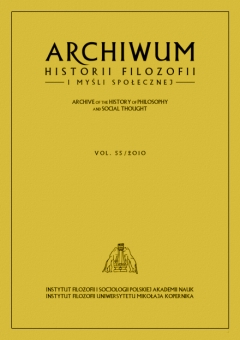The notion of substance in Spinoza’s Ethics and a problem with its interpretation
The notion of substance in Spinoza’s Ethics and a problem with its interpretation
Author(s): Jolanta ŻelaznaSubject(s): Metaphysics, Ethics / Practical Philosophy
Published by: Instytut Filozofii i Socjologii Polskiej Akademii Nauk
Keywords: Spinoza; Descartes; Ethics; language; definition; substance; nature; God; understanding;
Summary/Abstract: Spinoza searched for a language that could help him to create a monistic system of ethics. Latin was in the 17th century a fairly malleable medium of communication. In its philosophical use it was largely a creation of Descartes. Spinoza wanted to use it in a way that would resemble Euclid’s treatment of geometry. He needed a language that would clearly and precisely describe the process by which a man could liberate himself from the power of offection that hamper natural propensity for social peace and mental equanimity. He decided to begin by describing nature, which was responsible for man’s proclivities and abilities. Consequently he needed a new conception of substance which on the one hand could be defined by some initial axioms, and on the other hand would sufficiently flexible to include various aspects of human thought. It is interesting that when Spinoza had to make a choice between l exibility and content, he resolved to adopt a strict method of reasoning at the cost of the received understanding of substance. It is possible that these linguistic considerations led him to adopt the view that substance is identical with God and as such encompasses all principles of operations of the human mind and premises for the deriving of all fundamental notions popular in his times.
Journal: Archiwum Historii Filozofii i Myśli Społecznej
- Issue Year: 55/2010
- Issue No: 55
- Page Range: 91-100
- Page Count: 10
- Language: English

